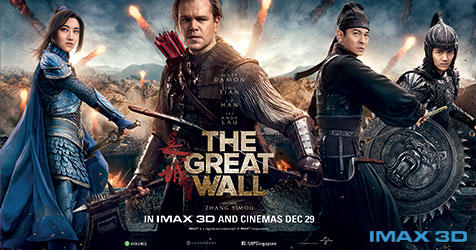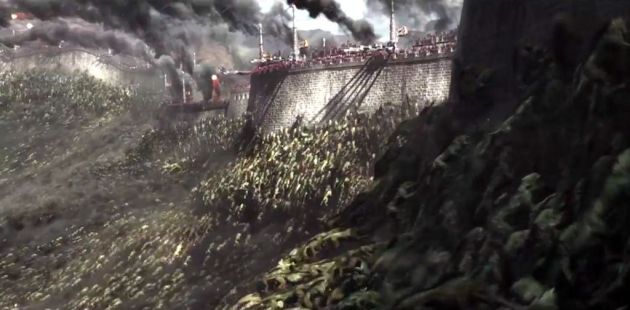This Movie Shouldn’t Be This Good
February 20, 2017 1 Comment
“It’s not what a movie is about, it’s how it is about it.”
-Roger Ebert
In 2011, a movie came out with the stupidest premise of all time. That premise was right there in the title: Cowboys & Aliens. I thought to myself, “Are Hollywood producers getting their ideas from their six-year-old kids now?” There was simply no way that movie was going to be anything other than b-movie dreck, and the only entertainment value it was going to have was in pointing and laughing at how terrible it was.
Then I watched it. And I loved it. Cowboys & Aliens was actually a really good movie, in spite of its premise. It had really good characters, a compelling story, good acting, good cinematography, and good directing. I was pleasantly surprised.
I was thinking of Cowboys & Aliens quite a lot when I watched The Great Wall, a fantasy action film starring Matt Damon.
The Great Wall is actually quite an interesting cultural artifact; in a way, it is a symbol of how globalized the world’s media has become. Filmed in Qingdao, China, The Great Wall is the result of a partnership between the American and Chinese film industries that is, in essence, China’s attempt to have a breakout global blockbuster hit. The film was produced by Legendary East, the Hong Kong-based subsidiary of American film company Legendary Entertainment, which was itself bought by a Chinese company called the Wanda Group in 2016. The film was directed by Zhang Yimou (Hero, House of Flying Daggers), and it was written by a team of Americans that included Tony Gilroy, who wrote the Jason Bourne movies. Apart from Damon, Pedro Pascal (Narcos, The Adjustment Bureau) and Willem Dafoe (Platoon, The Grand Budapest Hotel), almost all of the cast is made up of Chinese actors and actresses. This movie is the most expensive to ever be filmed in China, costing $150 million to make.
So, considering how important this movie is to the Chinese film industry, how expensive the movie was to make, and what a massive gamble this film represents, what was the premise they chose to go with for this would-be breakout global blockbuster hit? Ancient Chinese soldiers on the Great Wall of China fighting hordes of hideous green alien monsters.
Yes, really.
I laughed out loud when I saw the trailer for this film. I simply could not believe my eyes. I thought to myself, “They have to be joking, right?” Surely, this was going to be an epic flop. It was going to be one of the biggest disasters of movie history, I thought, and decided that I had to see what a horrible atrocity this film was with my own eyes.
Once again, I was dead wrong.
Just as with Cowboys & Aliens, the movie took its patently ludicrous premise and ran with it. Somewhere along the line, Zhang Yimou and the rest of the team making this movie must have had a meeting and decided, “Look, this is a movie about fighting alien monsters on the Great Wall of China. But, darn it, we will make the best movie about fighting alien monsters on the Great Wall of China that has ever been made!” Boy, did they deliver.
It seems to me like the trick when dealing with a crazy premise like this is to focus on developing a very good core story and use the bizarre stuff as window-dressing. Cowboys & Aliens was, at its core, a really good Western that just so happened to have aliens in it. Likewise, The Great Wall is, at its core, a film about an outsider caught in the middle of something way over his head. The movie works because it grounds the human drama and makes that part so believable, you are willing to suspend your disbelief for the green monster parts.
Indeed, the movie takes great pains to make everything that happens on the human side “make sense”. What are two white guys doing in China? They are on a mission to learn the secret of gunpowder and bring it back to Europe. Why do some of the Chinese characters know how to speak English? Another European had arrived several years ago to do the same thing, and taught those characters English. The Chinese armies use all manner of fantastical weapons and war machines, but the film shows us how each of these machines works using technology that would have been available at the time. These may be minor details, but so many movies would have just ignored or glossed over them, the fact that this movie takes time to explain them shows a commitment to world-building that really pays off.
It really is the acting, though, that pulls the whole thing together. The sincerity in their performances really drives the drama and makes me willing to buy that they really are in a fight for their lives against an enemy they don’t fully understand. I was particularly impressed by the performance of Tian Jing (Special ID, The Warring States). If The Great Wall performs as well as its makers hope, she might start showing up in more Hollywood movies, and if so, she deserves it.
Of course, in a movie this expensive, one would hope the special effects are excellent, and I can assure you that they do not disappoint. If you like epic movies such as The Lord of the Rings films, you will find plenty to enjoy here.
If there’s one lesson to take away from all of this, it’s that you shouldn’t dismiss a movie out of hand because of its premise. Sometimes, a good movie just might surprise you out of nowhere.

